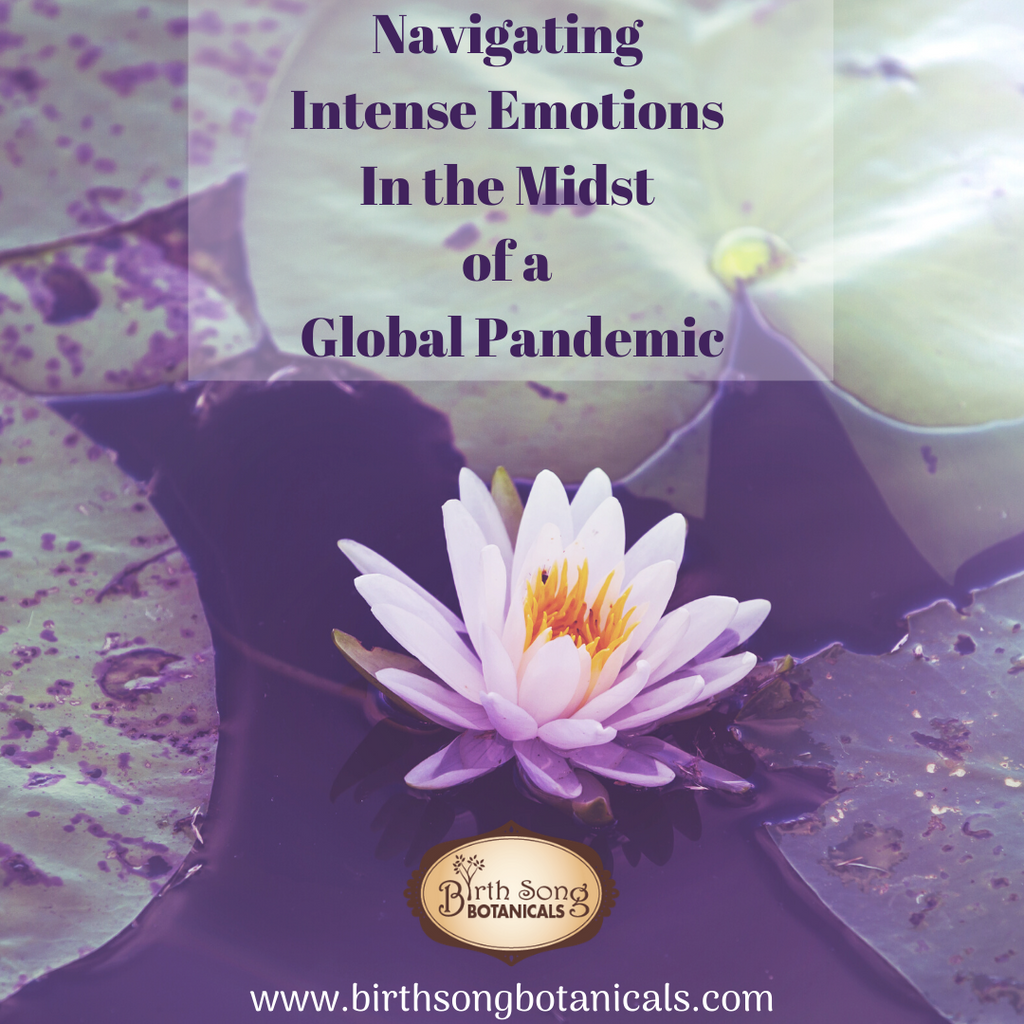Self Mastery How to Navigate Intense Emotions. No Mud. No Lotus.

Wow! Here we are, 2020, in the middle of a global pandemic! Lots of us are experiencing waves of intense emotions and are looking for ways to stay centered in these extraordinary times of uncertainty. On today's episode of Apothecary Wisdom, we are exploring how herbs and meditation guide us through uncomfortable emotions and establish deep roots even if it seems like the landscape is shifting.
Watch on Youtube:
Listen on SoundCloud:
Here we are, these spiritual beings having a human experience. We are feeling so many emotions simultaneously. They come in waves, fluctuating from worry about finances, the COVID 19 virus. We worry about getting sick, our loved ones getting sick, We get angry about how our government is managing this situation. It is stressful feeding our family and being cooped up with lots of people in a small space. While others are feeling isolated and alone. The realization of just how unsustainable everything seams, how we live our lives, educate our children, grow our food, tend to the sick, birth our babies, govern our countries is daunting.
The uncertainty of it all is unsettling for people. We want to know what to expect. Some people prefer the doomsday scenario because, at least, now they know what to expect. Rather than being open to the neutrality of an unknown future.
Personally, I find some comfort and a little excitement in the uncertainty. It makes me feel alive, it activates my instincts, my courage, my commitment to showing up and being a presence, to hold space for humanity, and to be of service.
Remember that we are living in the here and now. We only have this present moment. We are born for this. We have been preparing for these challenges our whole life. We are spiritually connected people who have cultivated a healthy life, with self-care and mindfulness practices. We know what to do. We have all the information, the support, and resources available to us, even if it doesn't seam like it in the moment.
So, if we're so spiritually centered, comfortable with uncertainty, we know that change is the only constant, that nature is neutral and that we are not exempt, especially not from pandemics. Why are we so triggered? Why are we reacting in ways that surprise us, and that activates old unhealthy patterns of behavior? An even better question is, how do we navigate these experiences and stay in alignment with our truth?
All of us here have found peace and harmony and moment later have been enraged, angry, lashed out at someone, or felt the contraction of fear take grip in our bodies. In a blink of an eye, we are pushed off our center. We didn't even see it coming, and there we are a hot mess of fear, guilt, judgment, and grief.
So, how do we navigate these emotions and stay in alignment?
Do you know the difference between at taiji master and a novice? They both get pushed off their center. The difference is the master knows how to return to her center faster. She has practiced more repetitions of returning.
To find and maintain our center, we need to cultivate daily practices that establish deep roots. With regular practice, we learn how to adjust as we go, we refine, we practice, we breathe, we listen, we follow, we adhere, we accept, we cry, we rest, we get up and do the work, again and again. We keep showing up and turning toward the situation. It's not perfect. It's messy.
Establishing stability is a process, and not a one size fits all experience. As an herbalist, it's my responsibility to highlight our body's need for foundational nourishment. We need to be fed to feel fulfilled. Nourishment looks like drinking nourishing and adaptogenic herbs, drinking pure water, getting enough sleep, moving our bodies, having a secure, reliable immune system, and allowing herbs to support us when we feel stressed, anxious, or overwhelmed. I've made lots of videos about those topics that you can find in the associated playlists on our youtube channel.
Last week we made tinctures, and I talked about the alchemy of self. Alchemy transforms one state of being or matter into another state of being or matter. We can transform a poisonous toxic plant into medicine, just like we can transform damaging toxic thoughts and emotions into wisdom and grace.
Last week on the Youtube channel we made medicine, this week we embody wisdom and grace as our medicine.
From a Buddhist perspective, all suffering is caused by our attachment to the six emotions of happiness, anger, sorrow, joy, love, hate, and desire. These emotions are thought to create pain and cause physical, mental, and spiritual suffering. Not all of us are striving for enlightenment and clearly have not detached from these emotions nor want to. In order to achieve that goal, the monks retreat to the mountains and live in seclusion. We live in modern society with our feelings and with our stressors. We live with other people and their emotional stressors. We are not looking for an idealized goal of sainthood, but for a healthy and peaceful life.
We may not live as monks, yet clearly, there is truth and wisdom in the understanding of how damaging unchecked emotions are. When our anger is out of control, it hurt us and those around us. Our emotions dominate our behavior; they affect our ability to think clearly, act reasonably, and show discernment. When we are reacting from a place of extreme emotions, we are responding to false truths.
How do we control our emotions, our anger, and fear? From a Qigong perspective, the goal is to cultivate a practice that provides a framework or a method, to relax the body, deepen the breath, focus and calm the mind, and raise the spirit. These practices help us shift our awareness and perspective to resolve the situation. In Qigong philosophy, we have two minds an emotional mind and a wisdom mind. The emotional mind is described as a monkey. It bounces around from thing to thing, it's unruly, it's disruptive, it causes chaos and destruction. The wisdom mind is compared to a horse. It has a strong will, it's reasonable, and it can carry out a focused task. When these two minds work together, our inner humanity and authenticity are manifested.
Through meditation practice, you learn how to direct your mind to follow your breath, relax your body, and raise your spirit. Eventually, you learn how to control or train the monkey to not trash your place but to sit quietly and peacefully at your side. The books describe this process as needing to put a leash on the monkey and putting him in a cage to contain and control him.
Of course, my perspective is similar and different.
The thing about the monkey is that he is a sentient being. You are a human with emotions, you are a sentient being. When we want to train the monkey we need to create a container of safety, for teaching, molding, shaping, directing and redirecting, we need clear and healthy boundaries, we need to coexist with the monkey, to coexist with intense emotions within us.
There is so much information in emotions. Emotions are energy in motion. The goal is to strike a balance between cultivating an understanding of our feelings vs. controlling them, dismissing them, suppressing them, hiding them, making them submit to how we should feel instead of how we do feel. There is a vast difference between what we should want and what we do want. Controlling the emotions instead of learning from them and integrating with them just provokes them to get stronger and persist. What we resist persists.

Everything has an origin. All our emotions and feelings have roots. Most of our coping mechanisms and patterns of behavior stem from our childhood. Many of us did not grow up in families where we were fully loved and accepted, felt safe, were never abandoned if we did not behave or perform the ways our parents, teachers, and authority figures wanted us to. We learned how to behave in ways that protected us, so we felt loved, safe, and accepted even if it meant suppressing parts of our selves that are healthy and natural.
The next time fear or any strong emotion rears its head, instead of getting swept away by it, or pretending it's not a problem, or by placing a leash on it and placing it into a cage attempting to control it and make it submit to your will. Instead, cultivate a relationship with it. Sit with it, listen to it, get to know it better, find it's the origin, learn to understand it, find out what it needs, give it what it needs, take care of it, tend to it, love it, accept it for what it is. Find appreciation for what it has already given you.
To do this, close your eyes, take deep continuous abdominal breaths, and feel the emotion in your body. Observe the sensation. Ask yourself when was the last time you felt this way. Don't look for the answer. Allow it to come to you. Be with this experience until you are ready to go deeper. Now staying with your breath and the sensation, ask yourself when was the first time you felt this way. The origin of this feeling may be from early childhood before you were verbal. You may not get concrete images. You might only get perceptions. That's okay. Again don't go looking for it. Allow the memories to come to you. Once you perceive the moment, tend to that child. What is that child needing right now? Give her what she needs to feel safe and loved at that moment.
This is how we learn and integrate the emotions instead of being wounded by them over and over again. When we integrate with our emotional wounds, and past traumas, we not only integrate ourselves, we shift the old patterns carried in out bloodlines and the human collective of the past, present, and future.

Another way we can soften our emotions is to acknowledge the process that other people are going through right now. There might be a person in your life that you care about who is acting or behaving in a way that you don't understand. The communication between you might be blocked and not flowing with ease and grace at the moment. Here is a simple energetic exercise to hold you both in empathy and compassion. Close your eyes and follow your breath to find that person. In your mind, embrace both of you and hold you with compassion and understanding for your internal process. Allow time, space and empathy to permeate the both of you. Realize that you do not fully understand the patterns that have been triggered within them.
From a place of not fixing or interrupting their process, allow your energy to expand in a generous way to hold the both of you. Allow the energy between the two of you to reboot to refresh as if you could wave a white peace flag. Say, I'm here, and I care about you and what you are going through.
Right now, as this virus holds us in its grasp, we are being forced to face our fears and to face ourselves. We have the choice, we can stay trapped in our old patterns and continue to get swept away, or we can transform them into wisdom and grace.
I choose to do the work of transforming them, little by little, this is a refining process that takes patience, endurance, courage, humility, and commitment.
Remember, the goal is not mastery over our emotions. Just like we don't want mastery over Qigong, midwifery, parenting, herbal medicine, meditation, or yoga. We want mastery IN Qigong and our healing practices and our mothering. We want mastery IN our fears, anger, happiness so we can integrate with them and coexist harmoniously. That's what Qigong teaches us. It shows us the vast difference between putting your mind on something and putting your mind in something.

If you'd like to start or deepen your Qigong practice and learn practical methods of refining your emotional and wisdom mind, join me Friday mornings class begins at 10 am central time. This is a simple follow along class that focuses on the daily physical and energetic practices that connect us with our mind, body, breath, and spirit.
Click here to get more information about the live Qigong with Maria class.
I am going to wrap this up and say thank you for spending the time with me today.
Until next time my friends, drink deep and always walk in beauty!
Calm your nervous mind with
Solid & Serene Herbal Support for Stress

✨Want More like this? Check These Out!👇🏽
25 Simple Ways To Improve Your Mood!
St. John's Wort: For First Aid, Nerve Pain, and Mood Support
Herbal Support For The Winter Blues and Seasonal Affective Disorder
The Incredible Benefits of Shatavari for Women’s Health
Postpartum Depression and Anxiety- How Herbs, Placenta Pills and Meditation Can Help
Exploring Herbal Support for Perimenopausal Women
Nourish Your Gut Health with Prebiotics and Chlorophyll
Herbs and Practices for Grief and Disappointment
The Heart-Opening Magic of Hawthorn
Shake, Release, Heal: How Shaking Regulates the Nervous System
The Birth Song Botanicals Guide to Motherwort Herb
Herbal Treatments for Postpartum Depression and Anxiety: What You Need to Know
Botanica Erotica: Exploring Sensuality and Aphrodisiac Herbs
Remember to:
Like our Birth Song Botanicals Facebook Page
Follow Birth Song Botanicals Co. on Instagram
Read our Birth Song Botanicals Blog
Watch Birth Song Botanicals on Youtube
Listen to Birth Song Botanicals on SoundCloud
Be inspired by Birth Song Botanicals on Pinterest






